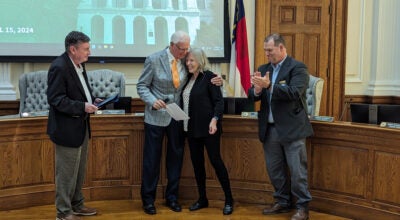The two-hour Congress
Published 12:00 am Wednesday, August 13, 2014
SALISBURY — Food Lion cofounder Ralph Ketner said if he ever keels over and dies instantly, you should check with the last person to whom he spoke.
No doubt, Ketner said, that person will have shocked him to death with another wasteful thing the government did.
Ketner was one of about 20 people who showed up for a Monday night workshop in which participants took whacks at reducing the federal deficit and putting programs such as Medicare and Social Security on the right fiscal path.
In other words, they became congressmen and congresswomen for two hours. The group broke into three tables where everyone debated the same “principles and priorities” being discussed by Congress today.
The Concord Coalition, a nonpartisan, grassroots group dedicated to educating the public about federal budget issues and their consequences for the future, facilitated the workshop.
U.S. Rep. Virginia Foxx, R-N.C., and three people from her staff set up the event at the Rufty-Holmes Senior Center. Foxx went from table to table during the night reminding everyone their budget deliberations weren’t as easy as they looked and that she has to deal with these kinds of questions “almost every day.”
The Concord Coalition’s Sara Imhoff, who guided the workshop, encouraged participants to take advantage of this “opportunity to make hard choices.”
The Concord Coalition doesn’t care, she added, if you want big government or small government, “just be able to pay for the government you choose.”
I had fine folks at my table, and I will keep their names to myself, just in case one of them should want to run for Congress some day.
When we were finished with making our hard choices over four broad categories, I’m sure we would have alienated farmers, Realtors, veterans, active military personnel, senior citizens, businessmen, federal government workers, millionaires and people who work for charities.
At the end of the night, my table alone had eliminated almost $3.5 trillion on the federal deficit over the next 10 years.
While other tables were sharing their budget calculations and the programs they would fund, reduce or eliminate, I thought our group had at least found a way to provide term limits in Congress.
None of us could have been re-elected, because we ended up being cold and heartless to about every member of society.
ggg
We were given an exercise that gave us budget options on 38 different things — big things — that have been debated in Washington. We were asked to make decisions on each, but use our time wisely.
Each item had a monetary figure on how it could increase or reduce the federal deficit. The four broad categories containing the 38 options included general government; defense and homeland security; healthcare and Social Security; and revenues and taxes.
Our table, recognizing how fruitless it would have been to discuss every single item, went for the biggies instead.
We came to the easy agreement there would have to be comprehensive tax reform which would increase revenues and reduce the deficit by $1.2 million by making the tax code simpler.
We also thought capping the federal Medicaid contribution to states and putting it in the form of block grants also was a good way to save $450 billion.
On Social Security, we knocked $460 billion off the deficit by increasing the maximum taxable earnings cap for the Social Security payroll tax.
We also thought it was necessary to limit TRICARE health insurance benefits for military retirees and dependents, separate from what’s available from the Veterans Administration in service-related healthcare. That was a $71 billion savings.
Our group said freeze discretionary spending at 2014 levels to save $688 billion. Also, reduce the federal workforce by not filling some vacancies as workers retire to save $43 billion.
When it came to eliminating NASA’s human space exploration program, we couldn’t do it, though it would have reduced the deficit by $73 billion.
ggg
Our work seemed callous, but I must throw in the observation that things are pretty dire. Our federal debt is $17.7 trillion and growing. The interest alone is killing us.
We’re on a fiscal path than cannot be sustained. Right now the debt held by the public as a percentage of the Gross Domestic Product is 74 percent, a doubling since 2007.
The federal budget deficit is another problem. It was $680 billion in 2013, meaning the country spent way more than it brought in.
As she made visits to each table, Foxx said Congress has cut discretionary spending to 2007, 2008 and 2010 levels, “and we still got a deficit.” The big problem facing the country, she said, was that programs deemed as mandatory spending are on “automatic pilot,” while also representing two-thirds of the federal budget.
Medicare is an example. It’s open-ended, with no limits. The average couple today drawing on Medicare takes out three times in expenses what they put in during their lifetimes.
Yet who is going to be brave enough to put a cap on Medicare? Who is going to tamper with Social Security? Where once there were 16 people working and contributing to Social Security for every person receiving benefits, now the ratio is three-to-one, and it soon will be one-to-one.
But if a member of Congress takes on any of these sacred cows and attempts real reform, he or she is brutalized. You start to understand the inaction in Washington.
It’s like an old mountain saying: “You’ll sit a long time with your mouth wide open until a roasted chicken flies in.”
Contact Mark Wineka at 704-797-4263, or mark.wineka@salisburypost.com.





